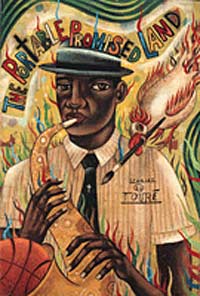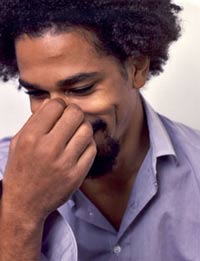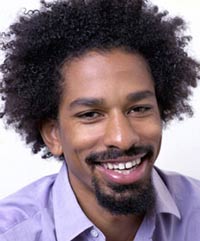

| Touré is a contributing Editor at Rolling Stone Magazine, the author of cover stories on Alicia Keys, Lauryn Hill, and DMX. He has written for the New Yorker, the New York Times Magazine, Playboy, the Village Voice, Vibe, and Tennis Magazine. The Portable Promised Land is a collections of short stories and his novel, Soul City, is coming soon. Find out more about
the writings of Touré at his website
|
The Portable Promised LandBy Touré (an excerpt) Afrolexicology Today’s Bi-Annual List of the Top 50 Words In African-America Introduction by Dr. Noble Truette, Ph.D., Professor of Slanguage,
Chairman of the Department of Afrolexicology at Negritude University,
and Founder of the Semiotics of Negritude Hall of Fame Project. In the 38 years since Afrolexicology Today began charting the importance of words we’ve carefully watched the constant flux that is the language of African-America. Every year old words gain new meanings and new words are created from old ones and some are just built from scratch—as if people are baking fresh words every day—pouring the stories of our history into them like butter into fresh bread. Long after the stories have been lost you can somehow taste them when you put the words in your mouth. Words filled with music and fireworks and untranslatability. Words that work like dog whistles—Black whistles—their sound available only to those who can hear at the higher frequencies. Words that fly toward white ears but never make it, falling from the air like lame arrows. Words that zoom into our ears like invisible ICBMs doing happy damage on the Black mind. For the past three months the board of the Semiotics of Negritude Hall of Fame Project, 16 scholars from universities around the country, has placed Black English under a microscope to figure out the precise state of this language right now. As we considered each word we asked ourselves how many generations, classes, regions, and sub-cultures of Blackness have embraced the word? Is there an interesting sonic texture to the word? Does it look pretty on a page? Is it a pure onomatopoeia or at least vaguely onomatopoetic? Is it a recontextualizing of an English word, or better, a corruption of an English word, or best, a brand new creation? Is it so uniquely able to express a feeling or concept that it’s been adopted into contemporary english, or better, has it remained in the Black community and not been adopted into contemporary English because it is impenetrable, simply impossible to be translated in its precise totality? Does the word have grammatical flexibility, usable as noun, verb, and adjective? Is it seminal in communicating a particular piece of the Black experience? We are always more impressed with linguistic innovation than with words that represent our culture. Though African-Americans are renowned for our sense of rhythm, it is the concept we have mastered, not the word we have innovated. However the word swing, in the sense of ‘it don’t mean a thing, if it ain’t got that…’ is a linguistic innovation. As well we remain sensitive to fluctuations in common usage. The same way whites have historically fled from neighborhoods once Blacks began moving in, we tend to flee from certain words once whites start to use them. For example, the word dude was a Top 10 lock in the 60s and early 70s, but in the 80s it was devoured by white culture. Dude has not been among the Top 50 in well over a decade. Finally, as always, this is not a glossary. A glossary is explicative and it’s simply not possible to give precise and complete meanings for many of these evanescent multi-entendres. The top words, the most seminal ones, are especially adept at defying definition. As verbal scholars and lingual historians we do our best to provide definitions. As Black people we know this is ultimately a list for those who know. 50. Be. [Considered as a verb: ‘He be here.’] Always a nice little thing to toss in, be can Blacken up any sentence. Be is a trickster, though. Easy to misuse, it can make users sound foolish, turning the small word into a bellweather. 49. Bling-bling. [Adjective, ‘Yo, that Jesus piece is bling-bling!’ and verb ‘Yo, you peep all that ice he sportin? He bling-blinging!’] A word that has bubbled up during the last few years from hiphop generation Blacks in the south. It means wearing diamond jewelry or generally conspicuous consumption. The entire board was impressed with its wonderful onomotapoeticness—the two sounds are the sonic representation of the brilliant shine of diamonds in the sun. 48. Pimp. [Noun ‘He’s a pimp,’’ and verb ‘Look at him pimpin down the block,’ and adjective ‘I’m just so pimpalicious!] The chaunvinist implications of the word kept many scholars from voting for it, but this one little syllable represents a job, a mindset, a way of life, a way of walking, a way of talking, a way of dressing, a pejorative, and a high compliment. Variations include pimped down, pimp stride, pimp stroll, pimp shades, pimp roll, pimp steak (a hot dog), pimp sticks, pimpish, pimply, pimpmobile, and parking lot pimping. 47. Funky. [Noun ‘You is funky,’ adjective ‘You dance funky,’ and verb ‘Now you gittin funky!’ Also fonk.] The dual meaning of something that smells bad and something that is essentially soulful is an interesting collision. Unfortunately, debate led by new members over whether funk and funky were truly two different words or a variation on one word paralyzed our group for an entire week and deeply divided the board, dropping both words lower than ever. 46. Sometimey. [Adjective ‘You never know whether she’ll show up or not. She’s so sometimey.’] A great little corruption that’s difficult to translate. The word moody is partially correct, but an incomplete definition. As yet shows no sign of crossover. 45. Oreo. [Adjective ‘He’s an oreo.’] A person of African descent who has European mores: Black on the outside, white on the inside. After all these years still the leading Black on Black pejorative. 44. Funk. 43. True. [The affirmation. ‘That shit was hot!’ ‘True.’] 42. Cold. 41. Peace. A salutation of serenity in a time of violence. 40. Stylee. 39. Fresh. Once a Top 5 word, has lost favor in recent years. 38. Down. 37. Folk. 36. Git-down. [Noun and verb: ‘Ya got ta git-down wit the git-down.’] As Professor Lovejoy-Shuttlesworth said with vote-swaying eloquence, “any word that’s commonly used twice in the same sentence to mean two different things belongs in the hall of fame.” 35. Hype. [Adjective, ‘That beat sound hype!’] 34. Nubian. [Adjective] A great sounding word, pretty to look at, the modern expression of Afrikan pride. 33. Groove. [Noun, verb, adjective] Represents a tight, rhythmic
sound as 32. Juice. [Noun: ‘He’s got juice.’] Power. Also liquor. 31. Co-sign. To agree. ‘I’ll co-sign that!’ 30. Flow. [Noun, verb, adjective] 29. Ghetto celeb. There is simply no single word that captures what this pair does. From an interview with a boy on the street: “Ghetto Celebs have a talent the ghetto respects and get rewarded with heaps of juice, but if you ain’t got skills you could still become a Ghetto Celeb. For the love of status niggas will do anything. Yo, I heard you robbed a bank and they still ain’t catch you! Ghetto celeb. I heard you was in a shoot-out and two of your niggas got killed, but you killed the two niggas that killed your niggas! Ghetto celeb!” 28. Irie. 27. Gwine. [Also gwyne, pronounced goin.] A massive word. From Skip Gates’s Figures In Black: “Gwine, for instance, is still commonly found in Black speech. It is basically untranslatable, yet, with a little reflection, we must see that the full import of the word goes far beyond its referrant, “I am going to,” and implies far more. “Gwine” implies not only a filial devotion to a moral order but also the completion, the restoration, of harmony in what had heretofore been a universe out of step somehow… “Gwine” connotes unshakeable determination… leaves no room for doubt, for question, for vacillation… With “gwine,” people accept their primal place in the bosom of God.” 26. Ghetto Fabulous. 25. Brother/Sister. Words that remind us we are family, that our family ties have been rebuilt along different lines. 24. Tain’t. From John Edgar Wideman’s New Yorker essay “Playing Dennis Rodman”: “I knew the word ‘tain’t. Old people used it, mainly; it was their way of contracting “it ain’t” to one emphatic beat, a sound for saying “it is not” in African-American vernacular, but also for saying much more, depending on tone, timing, and inflection. But I’d never heard ‘tain’t used to refer to female anantomy—not the the front door or the back door but a mysteriously alluring, unclassifiable, scary region between a woman’s legs (“ ‘Tain’t pussy and ‘tain’t asshole, it’s just the tain’t,” to quote Walter Bentley)—until a bunch of us were sitting on somebody’s stoop listening to Big Walt, aka Porky.” 23. Mojo. 22. Vodou (also voodou, voudou, vodoun, vodun, vaudoo, vaudou, voodoo, and hoodoo). 21. Ain’t. Lingual scholars still have yet to determine what two words this staple of English was originally contracting. Possibly is not, maybe are not, or neither. 20. Nappy. A general signifier for all things Black. 19. Jive. What would we do without jive? Attach it to hand-, –talkin, -turkey, -time, -ass, and a slew of others. A word as useful as those $19.95 ginsu knives. And plus, just look at it. It’s beautiful! 18. Kinky. An adjective modifying hair, sex, and possibly one’s entire persona, there is an inference in the word that Black sexuality is innately wild. 17. Homie. A corruption of the African-American linguistic innovation
16. Biscuits. A word for an essential bit of soul food became a word for a woman’s ass, an essential part of Black womanliness. (As well as a weak man who can be robbed easily.) What can better show the depth of a man’s desire for something of his mother in his woman? 15. Strangé. [Pronounced Strawn-jay! with an emphasis on the second syllable.] An exaltation commemorating extreme beauty, aesthetic triumph, gigantic flavor, or extreme Blackness, it is always said with an exclamation point. Still, the entire sense of it is difficult to capture on paper. Popularized by Grace Jones in Boomerang. 14. Bad. It means good—“That song is bad!” Inverts the traditional meaning of the word putting a contextual demand on the listener because only if you’re listening with a Black ear will you know whether the speaker says bad meaning bad or bad meaning good. As well, it represents the upsidedownnness of the Black universe, a world where bad is good. 13. Fade. A haircut (the fade), an instrument in hiphop (the fader), a shot in basketball (fade away), being high or drunk (he’s faded). 12. Boogie. [Noun, adjective, verb] From the boogie woogie bugle
boy to 11. Game. [Noun ‘The game is to be sold…’, adjective
‘He’s got game,’ and 10. Cool. A seminal encapsulation of how to survive as an African-American: keep your head under pressure. Exercise self-control. Don’t get hot. Be cool. 9. Downhome. 8. Soul. The essence of Blackness. 7. Hustle. [Noun, adjective, verb] A dance, a way of making money, and a very constant reminder that all Black life is all a race and that Blacks need to continually rush, think on their feet, and get on by any means necessary. To hustle can be to make something from nothing or to do something nefarious. We had quite a time the day we debated on where this word should fall in the rankings. Proof that a word with a tremendously popular song singing it’s praises never hurts, Professor Lovejoy-Shuttlesworth brought in a ghettoblaster and played the classic song “Do The Hustle.” By the first chorus we were all dancing and if you’ve never seen the way she dances, you’re missing an amazing, transfixing, hypnotizing sight. 6. The Blues. There’s a book about the word and its attending concepts by the great Albert Murray called Stomping The Blues. Nuff said. Before we get into the Top 5, one special citation. The West African language Wolof includes the word Waaw [pronounced ‘wow’] which means yes. This is an extraordinary example of how language can be mined to uncover the feelings of the people. Nearly all cultures believe in a Godlike figure who is the Creator, the entity responsible for the existence of everything. Who, at some point, said yes and brought everything into being. It is natural to feel that God is immense. At the same time, the sense of the sound wow is naturally immense, which is why that sound has come to be an expression of awe in English. There can be no simple coincidence that English gave the sense of awe the sound of wow as Africans gave the same sound to a simple but profound word that was first uttered by the Creator. Thus within the Wolof word for yes is the sense that God is great. 5. Swing. An ancient word in African-America, it has moved from
the old This is different than the example of people born fortuitously nomologically-speaking. Eddie Murphy, who often plays a contemporary urban trickster, a modern Brer Rabbit, a con man, has the good fortune of sharing his last name with traditional English: murphy is a word that means to con. Similarly, Michael Jordan is a Godlike figure showered with gifts from heaven who can seemingly fly like an angel. And, of course, in Afrolexicology we know the word Jordan refers to heaven or a river in heaven. Or Thelonious Monk whose two names together have the feel of his music, that first name a splash of melodic sounds, the last name a surprisingly pleasing thunk. Duke Ellington’s last name seems a corruption of the word elegant. Ditto Ralph Ellison, another elegant renaissance man. Cassius Clay’s birth name is marked by poetic alliteration, pre-saging the place of poetry in his life. Richard Wright’s family name is a homonym for the thing that made him tick. Miles Davis was that far ahead of his time. These are names so closely related with the talent of the person it described that if you gave a fictional character just such a name and ability it might seem a bit too obvious. 4. Nigga. Always a problem word. As usual it had enough votes to be #1, but was held back by a strong backlash from vocal opponents. This is the touchstone word in Afrolexicology, the word that divides scholars most avidly, much the same way war or abortion has divided America in past years. Many scholars saw the word representing an impressive victory, a repatrioted piece of lingual real estate. An equal number saw an uglyness in its sound and a lack of revolutionary intent on the part of users. All agree the word has occupied an immense part of our history, going from the worst pejorative possible to a modern greeting and compliment of the highest order, though common usage remains something of a minefield. The deep divide among scholars landed the word here at #4 though no one likes its placement! One camp wanted it much higher, the other much lower. 3. Fine. [In extreme cases pronounced foin, as in coin.] Of all the words in Afrolexicology there are few that are, to me, as interesting as this one. A compliment higher than beautiful, foin speaks specifically to Black beauty and speaks of self-love. A white woman can be beautiful, but only a Black woman can be foin. And in noting that someone has transcended beauty into that particularly nubian state called foinness, one not only says she is foin, but also that Black is beautiful, that the constant barrage of American propaganda urging the worship of blonde hair, thin lips, and skinny frames has not triumphed, has not blinded the speaker to that greater beauty called foin that rests only in the generous derriers and pillow thick lips of Black goddesses like Professor Lovejoy-Shuttlesworth. (God how I wish I were still married to her!) The word, I can say with confidence, will never be adopted into white culture because it is so impenetrable it can be said out loud in mixed company without giving away the depth of its meaning. 2. Mothafucka. [Noun, adjective, verb, conjunction, diss, compliment and easily the most history-heavy expletive we have.] A person, a place, a situation, a thing. A linguistic mountain: the ultimate emphasizer, attachable to almost any word or sentence to great comedic or serious effect. Like basic black it goes with everything. From Bobby Seale’s Seize the Time: ”Eldridge ran it down to me once… he said, “I’ve seen and heard brothers use the word four and five times in one sentence and each time the word had a different meaning and expression. “Motherfucker actually comes from the old slave system and
was a reference to the slave master who raped our mothers which
society today doesn’t want to face as a fact. But today, check
the following sentence: 1. Eeeeeuhhoowww! The grunt. The wail. The unspellable indisputable |


